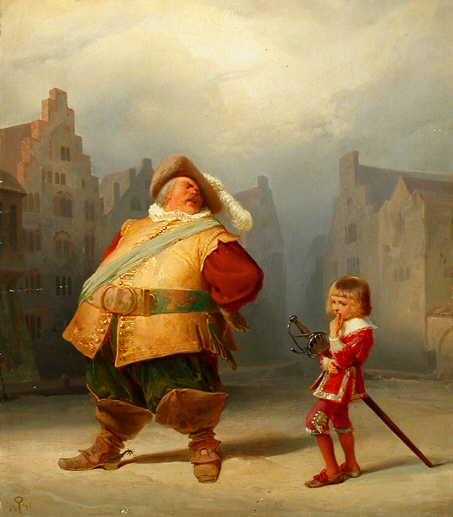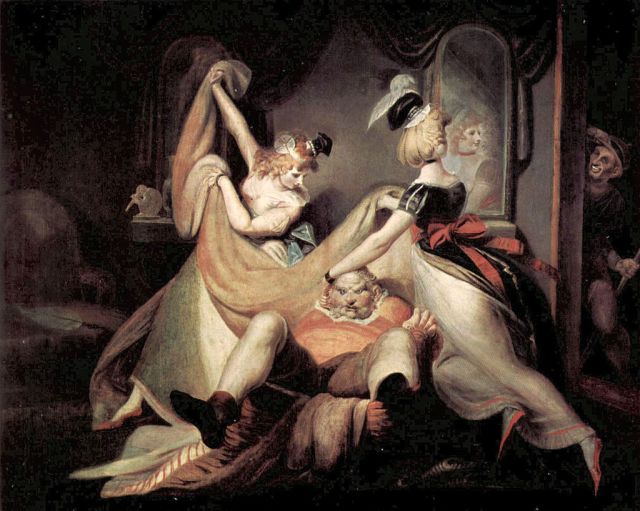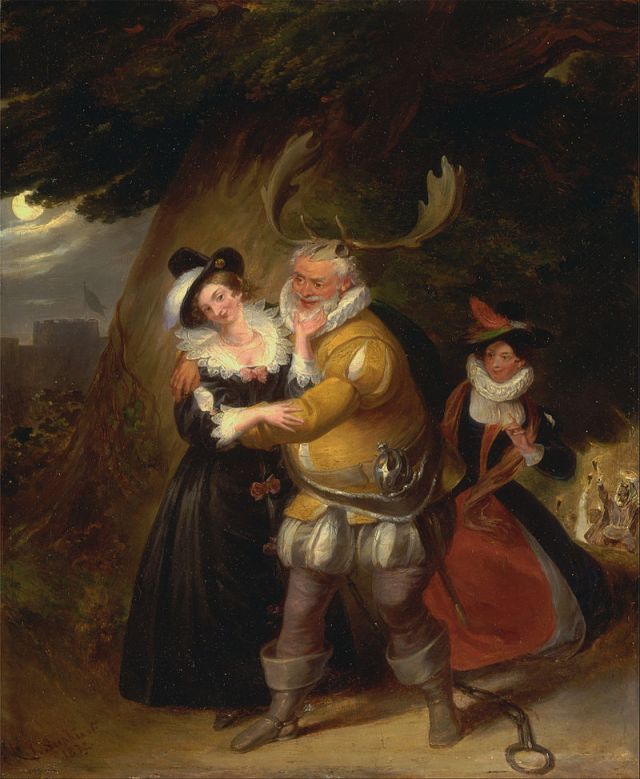(For a summary of the play, click here: Merry Wives of Windsor Synopsis)

Adolf Schrödter: Falstaff and his page (public domain)
After reading Merry Wives, I am fairly clear on the reasons I had not read it before. This is a play that is much better in performance than on paper. I have to imagine that if someone who is not an enthusiast was first exposed to Shakespeare by trying to read this play, they would run away screaming, and I couldn’t blame them. It’s so full of topical references, Elizabethan linguistic gymnastics, and visual jokes that trying to read it is a bit of a chore. I read a small paperback Folger library edition, which had notes on the page facing the text. At several points, there were so many notes that I had to flip three pages ahead to find out what I was reading in the text. Nothing kills a joke as quickly as having to explain it, so lots of the funny gets lost in translation.
That being said, I don’t think Merry Wives is a bad play; it’s just a difficult one for me as a modern reader, even more so than some of Shakespeare’s other works. It’s the same issue I might have trying to watch political sketches of Saturday Night Live from the 1970’s. I can understand it academically, but so much of the humor depends on knowing and being able to access the mood of the time from memory and experience that it is a bit lost on me. Unlike many of Shakespeare’s plays, Merry Wives is actually set in England, and although it’s supposed to take place a few hundred years before the time it was written and performed, it has a certain level of immediacy that other plays do not.
It’s worth saying as an aside here that many of the plays’ foreign settings are only referred to in the text, with no other support for the locale other than a character saying where the action is taking place (In fair Verona, where we lay our scene, for instance). Costumes in Shakespeare’s own theater were likely to be modern dress, which is why we have anachronisms like people wearing doublets instead of togas in Julius Caesar. This is also a good point to remember if you happen to run into someone who feels quite superior because they don’t approve of modern interpretations of Shakespeare. (Don’t get me started on people who think Shakespeare must be performed in a posh English accent, which is neither necessary nor historically accurate.) I actually think that bringing Shakespeare into the current day, or using a setting (temporal or geographical) based on a thematic element is a very Shakespearean choice to make, and there are many successful stage and film productions that have done it very well. (Baz Luhrmann’s Romeo + Juliet is the first film that comes to my mind, but there are many others with varying levels of success. Ian McKellen’s Richard III is another good one, which I believe started out as a stage production and was then made into a film.) The main point is, as long as the language remains intact, Shakespeare is open to a multitude of choices. Most of his plots were not original; he borrowed from history and other sources to make compelling stories for the stage. What makes Shakespeare Shakespeare is the language. Whether you watch it in an outdoor theater in the mid-afternoon sunlight standing shoulder level to the stage, which would have been the way groundlings watched at the Globe, or in a darkened movie theater with special effects sequences, there is something to be gained from watching talented people play out the language of Shakespeare.
Back to the subject at hand, by placing the popular history play character Falstaff into a much more domestic situation, Merry Wives gives us a wonderful glimpse into the concerns of Elizabethan England. The characters are litigious, language-garbling busybodies, and they are quite suspicious of foreigners. (Count the times someone insults the Flemish. The Flemish!) It’s almost like alternate universe fanfic of the perpetually broke Falstaff as a knight retired to the country (at least temporarily). What types of adventures—or trouble—would he find himself in?

Henry Fuseli: Falstaff in the Washbasket (public domain)
In his financially-challenged situation, Falstaff, who is already in trouble for poaching, decides that the best way to drum up funds would be to become the backdoor man of one (or both) the well-off eponymous Merry Wives, Mistresses Page and Ford. In the meantime, Mistress Page and her husband are entertaining marriage prospects for their daughter Anne. This fairly simple setup opens the door for five acts of truly inspired fat jokes, cuckold jokes, and jokes at the expense of a Frenchman and Welshman, who talk funny—in other words, the same things that we in the English-speaking world generally find funny today. Doctor Caius, the Frenchman who is wooing Anne, is a prototype of Peter Sellers’s Inspector Clouseau. My personal favorite Caius moment is the following line:
SIR HUGH EVANS If there is one, I shall make two in the company.
DOCTOR CAIUS If dere be one or two, I shall make-a the turd.
(MWOW 3.3.1621-22)
Yes, folks. It’s a poop joke, and in an outrageous French accent no less. Maybe Doctor Caius is actually more like an un-self-aware prototype of John Cleese’s French knight from Monty Python and the Holy Grail. We also have a funny-talker in the person of Sir Hugh Evans, the hilariousness of whose Welsh accent is lost on me. I guess this would appeal more to a British person, the way a Southern accent might sound funny to a Yankee in the US. Falstaff himself, whose rotundity is a huge source of the play’s humor (see what I did there?), jokes about his size as much as anyone else, making me think of him as an early Renaissance Louis C.K., although Falstaff has self-confidence for miles, never doubting that both Mistresses Page and Ford are attracted to him and will be happy to succumb to his seduction.
In the mix, we also have Frank Ford, Mistress Ford’s jealous husband. Falstaff’s former servants, Pistol and Nym, have turned traitorous after being let go due to Falstaff’s lack of funds. They decide to reveal Falstaff’s plan to woo the wives to the husbands. Page and Ford have very different reactions. Page couldn’t possibly care less. He has no doubt of his wife’s fidelity. Ford, on the other hand, takes the news as if his cuckolding is already a given. He becomes immediately incensed and cannot be dissuaded by anyone, regardless of the fact that there is no proof or even any indication that Mistress Ford is inclined to commit adultery. Ford even goes so far as to suggest that Page is a fool for not being similarly terrified of his own wife’s honor:
Though Page be a secure fool, an stands so firmly
on his wife’s frailty, yet I cannot put off my
opinion so easily: she was in his company at Page’s
house; and what they made there, I know not. Well,
I will look further into’t: and I have a disguise
to sound Falstaff. If I find her honest, I lose not
my labour; if she be otherwise, ’tis labour well bestowed.
(MWOW, 2.1.786-92)
If you’re at all familiar with the works of Shakespeare as a whole, you might recognize the character of the jealous husband from other plays. Both Othello and The Winter’s Tale feature jealous husbands prominently, but where there are serious consequences for the behaviors of Othello and Leontes, Ford’s jealousy is played for laughs, as both the audience and the other characters can easily see his folly. At no point does Ford’s jealousy put anyone in danger, and by the end of the play, all of his machinations to uncover his wife’s disloyalty do nothing but make him look sillier by the minute, and since it’s a comedy, by the end, his jealousy is overcome and he and his wife become closer than they were at the beginning of the play.
The play ends with a public shaming of Falstaff, but some of the bite comes out of it when it’s revealed the parents Page have been fooled too. Instead of falling for the tricks of either her mother, who championed Doctor Caius, or her father, who wanted Slender for her, Anne has married for love to Fenton, who has neither money like Caius nor land like Slender. Fenton is of high station (too high, according to Page), but he is financially dissolute, admitting to Anne that he was first interested in her because of her father’s great wealth. It is interesting, then, that Shakespeare gives Fenton an impassioned speech about marrying where one does not love being a recipe for disaster:
You would have married her most shamefully,
Where there was no proportion held in love.
The truth is, she and I, long since contracted,
Are now so sure that nothing can dissolve us.
The offence is holy that she hath committed;
And this deceit loses the name of craft,
Of disobedience, or unduteous title,
Since therein she doth evitate and shun
A thousand irreligious cursed hours,
Which forced marriage would have brought upon her.
(MWOW 5.5.2787-97)
He argues that a loveless marriage is the gateway to unhappiness, and “irreligious cursed hours” even suggests a propensity for sinfulness, perhaps in looking for love elsewhere than in the marriage bed. Whether the Pages agree with his reasoning or not, they understand that they’ve been outwitted and that what is done now cannot be undone, so they accept the marriage and move on. I think it’s worth pointing out that while Shakespeare writes a lot about marriage for love, what we know about the time period suggests that this was not the foremost factor for consideration when selecting a spouse. I’m sure it is what young people have always wanted, and it’s a romantic notion, but the reality of the situation was that class, station, and wealth were necessary considerations in the society of the time. But practicality doesn’t make for a happy, uplifting ending. Comedy is about affirmation of social norms, and ending on the high notes of a happy loving marriage for Anne, the blessing of the Pages, the reconciliation of the Fords, and the acceptance of Falstaff back into the group ties up all of the loose ends nicely.

James Stephanoff: Falstaff at Herne’s Oak, from “The Merry Wives of Windsor,” Act V, Scene v (public domain)
As with any Shakespeare play, there is so much more that could be said about Merry Wives beyond what I have discussed here, but my goal here on the blog has been to give an overview of my initial impressions of reading the play for the first time. My most excellent professor and mentor John Ford always had his students in Intro Shakespeare write a one- or two-page “blurb” after reading a play, which we would then bring to class to generate discussion. I am taking my cue from that assignment, although I might have failed a bit on the brevity part! If you are familiar with this play or interested in an element I have overlooked, please feel free to mention it in the comments. I’ll be back tomorrow with a post on my impressions of the 1982 BBC production of Merry Wives starring Richard Griffiths, Ben Kingsley, Prunella Scales, and Judy Davis.
